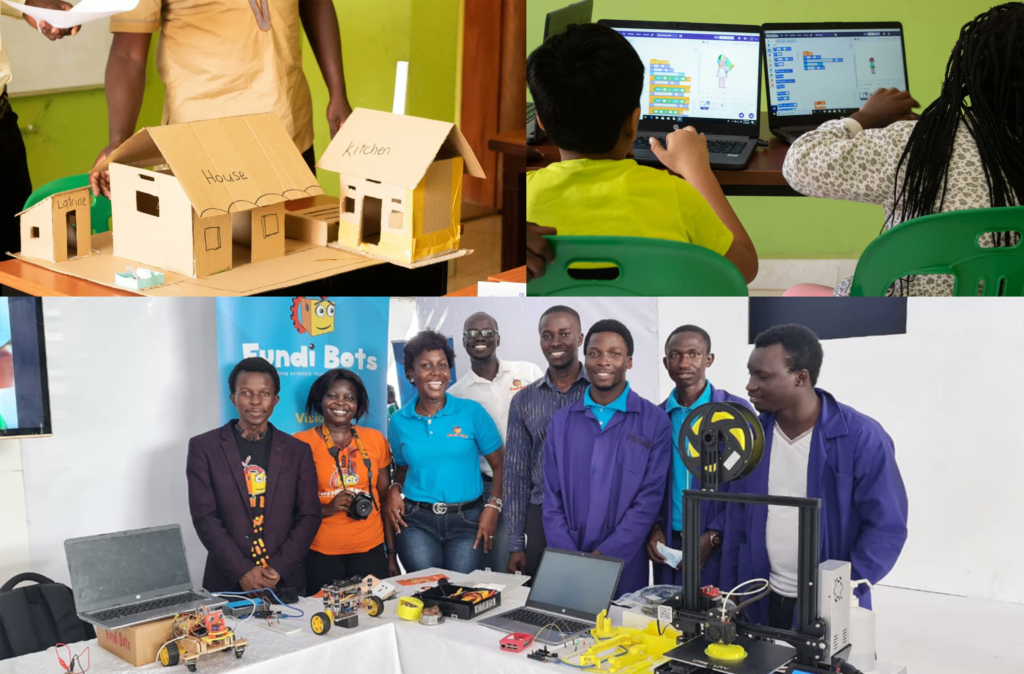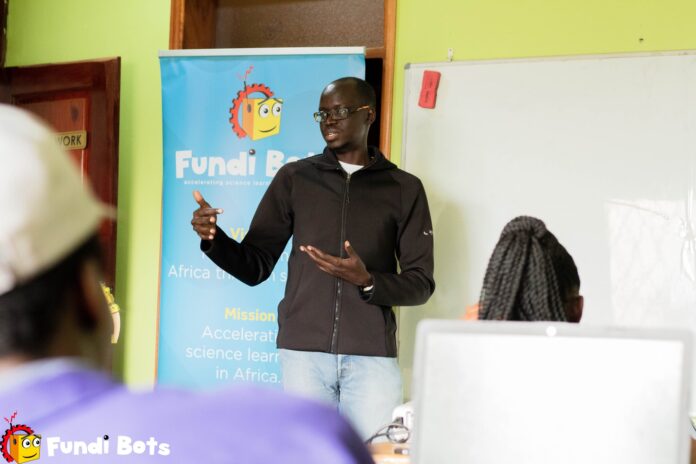Africa is expected to contribute more than half of the global population increase in 2050, according to a UN report. While this offers immense opportunities for the continent as its workforce is expected to be one of the biggest in the world, its education system is certainly not preparing students for that future.
“We are stuck in a model that’s designed to help pass an exam and move to the next stage without consideration for what the actual output of that knowledge is,” says Solomon King Benge, founder of FundiBots.
Synonymous with its robotics training, Fundi Bots is hoping to take on this mantle by championing and revolutionizing practical STEM learning.
“A lot of the tools that we are building are designed to help students look beyond the academic and see how we create practical engineers, scientists, inventors and biologists to help navigate the future that Africa is going to face.”
Growing up, Solomon King always had his hands full, exploring ways of building his latest toys. From making electric wire cars and helicopters to robots, nothing was off-limits for King.
“I was building very simple robots but there were things that were missing like my robots didn’t have any sort of intelligence. I had heard about Chemistry, Biology, and Physics and I was told that Secondary Schools had laboratories and all these things. I was very excited, only to reach Secondary School and find that it was just another place to pass exams and move on to the next level.”
Ever the optimist, he dug deeper and discovered that the kind of knowledge he wanted could only be found in books. As such, he became a constant fixture in the aisles of the library where he would later find his treasure trove, ‘The Engineer in Wonderland’ by Eric Laithwaite.
“The book was about electrical magnetism and was told in an amazing narrative way. It was a nice intersection of stories, science and the world.”
Solomon tried to interest his then Physics teacher with the idea of using the book to create Science experiments for students but was shot down, with the teacher saying ‘it was not part of the curriculum’.
While this conversation didn’t go as he envisioned, it planted the seed, for what would become Fundi Bots.
“I started Fundi Bots in 2011 as a hobby and collaboration with an organization called Café Scientifique. I used to go around schools teaching and talking to students about non-curriculum science topics that they wouldn’t address in class like space, and technology. But because I was making robots at home, a lot of students were very excited about learning the possibilities of that.”
The organization has since transcended beyond a hobby to a fully-fledged non-profit organization providing practical hands-on STEM training, learning tools and resources, as well as a bespoke curriculum.
“A lot goes into the designing of our curriculum. We get subject material from the mandated government curriculum; we design tools and practical learning exercises and then place them back into the classroom. So the robotics lessons are extracurricular while the enhanced science curriculum is intra-curricular.“
Fundibots operates several programs, that include; the integrated schools’ program, Fundi at school, Fundi at Home, Fundi Girls which empowers more girls to join STEM, and Fundi at Work which provides internships and skills training to get students workplace ready.
“Our robotics learning is a very practical hands-on way for students to explore the magical world of science. So as they build robots, they are learning about electrical and mechanical engineering and computer programming. Many of our students have never touched a computer before, so in the process of learning how to code they are learning how to use PCs too.”

Fundi Bots has so far reached more than 14,000 students with a target goal of one million African students by 2030.
However, King says, as more people embrace their robotics learning, they are faced with a bigger challenge.
“Scaling for education, especially hardware is really hard. With software, you can build, one tool and it can easily reach millions of students but when you’re teaching robots, you have to scale resources, people, machines and kit components which becomes expensive.”
To overcome this, Fundi Bots is leaping into commercial production to supplement the grants and donations that it heavily relies upon. “We are setting up a production space to explore revenue generation by primarily mass producing several tools like robotic kits.”
In recognition of the organisation’s laudable contribution, King has been the recipient of several global recognitions and awards. He is an Echoing Green fellow, Ashoka fellow and winner of the 2020 BYU Social Innovator of the Year.
King says while he is proud of the work they have done in making learning simple and fun, there’s a lot still more to do. He is looking to establish at least five science academies across Africa but the overarching dream for him would be their scaled impact rendering their operations irrelevant.
“That would mean for me that we’ve finished our work which means that we have shown that there’s a better way to teach science and now governments are taking it up and students are learning well in their schools, they don’t need us, that would be ideal. It’s a dream”.
As the general trajectory of the world shifts towards technology, machines and algorithms, solutions like King’s will undoubtedly go a long way in shaping Africa for the 4th Industrial revolution.
He advises other tech entrepreneurs to be relentless in their pursuit of carving out a better future for the continent.
“It’s a tough road, fundraising is hard, raising capital is hard, but as long as you believe in the work that you are doing and focus on building networks, teams, and fantastic products and teams, you will make it.”
